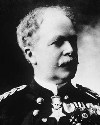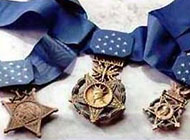|
Irwin, Bernard J.D.
 In
Apache Pass, Arizona, performed the earliest action leading to the award
of the Congressional Medal of Honor In
Apache Pass, Arizona, performed the earliest action leading to the award
of the Congressional Medal of Honor
|
(1830.06.24-after 1894 [retirement year]
) Congressional Medal of Honor recipient.
 |
| Bernard J. D. Irwin, recipient of the Congressional Medal of Honor, 1894. |
In
December, 1861, Congress passed a bill authorizing the production and
distribution of medals honoring the gallant actions of Naval personnel
during the Civil War. A second bill authorizing medals for Army
personnel was passed two months later. President Lincoln signed both
bills into law and the Congressional Medal of Honor was born.
When the authorizing bill was passed, Bernard J.D. Irwin was
an Assistant Surgeon in the United States Army. He was stationed in
the western territory which is now Arizona. The actions he took at
Apache Pass (about 26 miles east of Wilcox) on February 13 and 14, 1861,
would become the earliest to lead to the awarding of a Congressional Medal
of Honor.
 The citation for the medal reads that Irwin "Voluntarily
took command of troops and attacked and defeated hostile Indians he met on
the way. Surgeon Irwin volunteered to go to the rescue of 2d Lt. George N.
Bascom, 7th Infantry, who with 60 men was trapped by Chiricahua Apaches
under Cochise. Irwin and 14 men, not having horses began the 100-mile
march riding mules. After fighting and capturing Indians, recovering
stolen horses and cattle, he reached Bascom's column and help break his
siege." The citation for the medal reads that Irwin "Voluntarily
took command of troops and attacked and defeated hostile Indians he met on
the way. Surgeon Irwin volunteered to go to the rescue of 2d Lt. George N.
Bascom, 7th Infantry, who with 60 men was trapped by Chiricahua Apaches
under Cochise. Irwin and 14 men, not having horses began the 100-mile
march riding mules. After fighting and capturing Indians, recovering
stolen horses and cattle, he reached Bascom's column and help break his
siege."
Over 30 years later, on January 24,1894, when Colonel Irwin
was leaving the service, his act of heroism was finally recognized with
the awarding of the Congressional Medal of Honor.
|